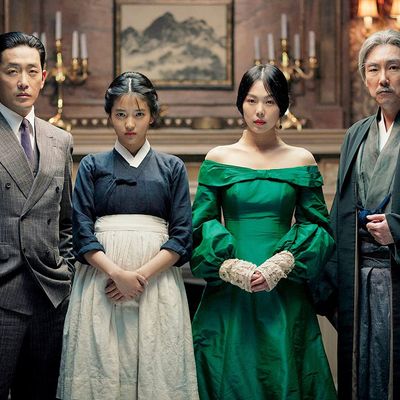
It’s a shame that popcorn isn’t allowed in the grand theaters of Cannes, because if ever a movie called for binge eating out of a tub, eyes riveted to the screen, it’s Park Chan-Wook’s The Handmaiden (French title: Mademoiselle), which jolted awake every bleary-eyed reporter at its packed debut screening Saturday morning. An adaptation of Welsh author Sarah Waters’s kinky, award-winning 2002 historical crime novel Fingersmith set in Victorian England, Park moves the action to 1930s Korea under Japanese colonialism, where class and tradition still loomed large, but a rich family could flaunt status by having electricity — which plays a dramatic role in the movie — in their big homes. Park is best known for his “vengeance trilogy,” including 2003’s Oldboy, but he seems far less interested in blood than Dangerous Liaisons-esque intrigue with this one.
“Was that as good as I thought it was?” a fellow critic asked as the lights came up; this Cannes selection has been disappointing thus far, so it was hard to discern if we both loved the movie because it’s actually good, or because it was just the metaphorical drop of water in our drought. Luckily, Amazon, quickly establishing itself as a movie distributor with art-house tastes and respect for the theatrical experience, bought the rights in February, so you will get to see it on the big screen.
The story, which is broken into three parts, each told from a different perspective, begins with a young woman named Sook-hee (newcomer Kim Tae-ri) leaving an orphanage to become the handmaiden of a Japanese heiress, Lady Hideko (Kim Min-hee). We follow Sook-hee as she is thrust from her humble beginnings into a forbiddingly vast house with a seemingly fragile mistress who hasn’t ventured beyond the property’s walls since she was a child. Lady Hideko awakens screaming from nightmares and tells tale of her aunt, who went mad under the same conditions, and hanged herself from the cherry tree just outside Hideko’s window. She also complains of exhaustion from her “reading lessons” with her creepy uncle with whom she lives and who is a collector of rare books, guarded by a cobra and kept in a secret chamber, to which Hideko must report every day. In an even creepier twist, Hideko is well-aware that her uncle — an ambitious Korean man who married her dead mother’s sister, now also dead — raised her so he could marry her and take her fortune.
But we’re also in on a secret that Hideko doesn’t know: Sook-hee isn’t just a naive country bumpkin; she’s a skilled pickpocket who’s been hired by a handsome Korean crook posing as a Japanese Count (The Chaser’s Ha Jung-Woo) to convince Hideko to marry him so he can steal her fortune and lock her up in a madhouse. What Sook-hee didn’t anticipate before signing on, though, was how beautiful and vulnerable Hideko would be, and how quickly she would come to care for her. And in an extended scene where Sook-hee places a thimble on her thumb, sticks it in her mistress’s mouth, and uses it to file away a sharp tooth, while Hideko stares longingly at her, mouth open, naked in a bath, we get the sense that their form of caring for one another may blossom into something else — which it does when Hideko employs that old “teach me how to kiss so I can be ready for my wedding to a man” trick, and soon Sook-hee is saddled with affection, even love, that runs counter to her reason for being there. The movie feels like a beautifully shot, brilliantly paced page-turner of a novel brought to life.
And that’s just the beginning of the surprises. Sook-hee’s narrative doesn’t go at all the way you think it might. Nor does Hideko’s, and unlike most movies telling the same story from different points of views, it actually deepens and enriches everything we’ve already learned. We see her bizarre upbringing; learn the real, perverse reason for those “reading lessons;” discover the true nature of her relationship with The Count. It would be cruel to spoil the many, many surprises that remain, but just know that there are mid-air sex demonstrations with a wooden mannequin; liquid opium; hidden moats; a prominent octopus; constantly shifting alliances; and, of course — this is Park Chan-Wook we’re talking about — at least one person getting appendages cut off. Plus, the switch to Colonial Era Korea from Victorian England adds a fascinating layer of Korean-Japanese ethnic strife, and all the subtle class issues that entails.
Fans of the book may be dismayed over omissions or liberties taken — and more than a few women I’ve talked to found the lesbian-discovery sex scene, which plays out again and again in increasingly graphic fashion through the different perspectives, to be exploitative and a male-gaze depiction of lesbianism. (Which maybe it is, but this female writer found it pretty hot.) Moreover, how often do we get to see an epic, lush, yet also pulpy, genre story that’s so firmly on the side of its female characters? The men of the film, even the handsome Fake Count, are all grotesque, leering, and clownish in some form. They treat Sook-hee and Hideko as one-dimensional, but the movie certainly doesn’t. These are women trapped by circumstance — Sook-hee by poverty and Hideko by men who just want her money — who in one way or another claim their own power and take revenge on the men who’ve oppressed them, in incredibly clever fashion. If that doesn’t sound like the kind of movie you want to see again the second after it’s ended, I’m not sure what I can do for you. If it is, let me recommend you buy the big tub of popcorn. It’s awesome — and 145 minutes long.

